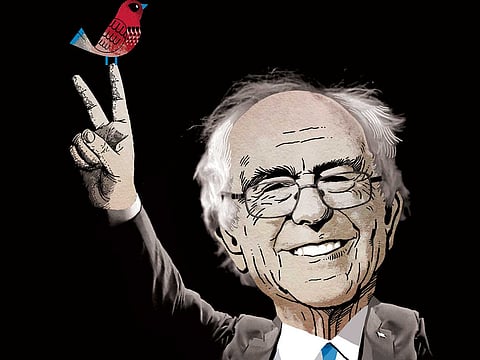There’s still hope for Bernie
With landslides in Washington, Alaska and Hawaii, his Democratic nomination hopes brighter than ever

Bernie Sanders needs to win big states by big margins to have a shot at the Democrat nomination and last Saturday, in Washington anyway, he did just that.
On what was arguably the best night he’s had since the New Hampshire primary, Sanders addressed an enthusiastic crowd in Madison, Wisconsin, hammering home all the major themes of his campaign from financial reform on down and emphasising that finally, “We have path toward victory”. His barnburner of a victory speech came at the end of an overwhelmingly positive night for Sanders. His wins in three Democratic caucus states — Hawaii, Washington state and Alaska — are on a par with Barack Obama’s victories over Hillary Clinton back in 2008.
Those are precisely the kinds of comparisons Sanders has been wanting to make. Now he finally has the opportunity.
When it comes to delegates, Washington constitutes the fifth largest state remaining on the primary calendar, and Sanders landslide victory there is a significant embarrassment to Clinton at a time when she’s been trying to act like she’s in a general election by aiming her fire at Donald Trump. Sanders’ wins will also erode her substantial delegate lead, and set the stage for battles in states where he could further derail her front-runner status.
The next such test is on April 5 in Wisconsin, a state where, while Hillary is polling slightly ahead, Team Sanders is hopeful it can pull off an upset. After all, Sanders won handily in the neighbouring states of Michigan and Minnesota (the former came as a big surprise). And Wisconsin in particular, with its reputation as a sort of cradle for the labour movement, plays in no small measure to Sanders’ strengths.
And while Saturday’s wins don’t constitute a massive sea change in the maths of the primary election of course — Sanders still needs roughly twice as many delegates as Hillary to clinch the nomination — it does play into Sanders’ argument that the momentum is on his side and that he may yet be able to sway the minds of superdelegates who have been breaking overwhelmingly for Hillary.
“We knew from day one we were going to have a hard time in the deep South,” Sanders told a cheering audience in Wisconsin. “That is a conservative part of our country. But we knew things were going to improve as we moved West.” He also drove home the notion that, as he put it: “Our campaign has the momentum.”
To increase that momentum, Sanders plans to take on Clinton not just in Wisconsin but also in New York, the former first lady’s adopted home state and the place her team has been counting on to put an end to Sanders’ western victory streak. (As Sanders’ chief strategist Tad Devine put it in a conversation with the Washington Post: “We’re going to make a real run for it.”)
Big surprise
The momentum argument, while it makes for a good soundbite, is not totally convincing upon closer inspection. Consider for instance, that the “momentum” Sanders enjoyed after a virtual tie in Iowa and a win in New Hampshire was followed up by a crushing defeat in South Carolina. And the “momentum” of his big surprise upset in Michigan, after much speculation about what good things this might mean for his prospects in other parts of the midwest, was followed by a solid beatdown in Ohio (to say nothing of defeats in North Carolina, Florida and beyond).
A more powerful argument for Sanders than momentum then might be that he’s proven he can reach certain demographics that are vital to the Democratic coalition. Aside from his stunning popularity with young people, however, he hasn’t been able to demonstrate convincing appeal among minority groups that are vital parts of his party’s constituency (though the win in Hawaii may help him make the case).
Even his all-important win in Washington last Saturday — while exciting for his supporters and important as he continues to justify his decision to stay in the election at a time when many in the party are looking to unite against Trump — is also telling in a way. Sure his message resonates in a state where the patently progressive Seattle — with its $15-an-hour minimum wage and socialist council member (the only on anywhere in the US) — sets the tone. But Washington is also an overwhelmingly white, caucus state, which means it has relatively low (read: undemocratic) turnout.
But it’s also a reminder that Sanders supporters are passionate enough to show up for him. And that is a key difference Sanders hopes to highlight, between his campaign and Hillary’s — “that one of our campaigns has created an enormous amount of enthusiasm and energy that will lead to a large voter turnout in November”.
He still can’t argue that maths is on his side; it isn’t. But there’s a good case to be made that enthusiasm really is. If enthusiasm is contagious — and the Sanders variety does show sings of that — that means time may well be on his side. No wonder he keeps trying to run out the clock.
— Guardian News & Media Ltd
Lucia Graves is a Guardian US columnist. She was previously a staff correspondent for National Journal magazine and a staff reporter at Huffington Post.


